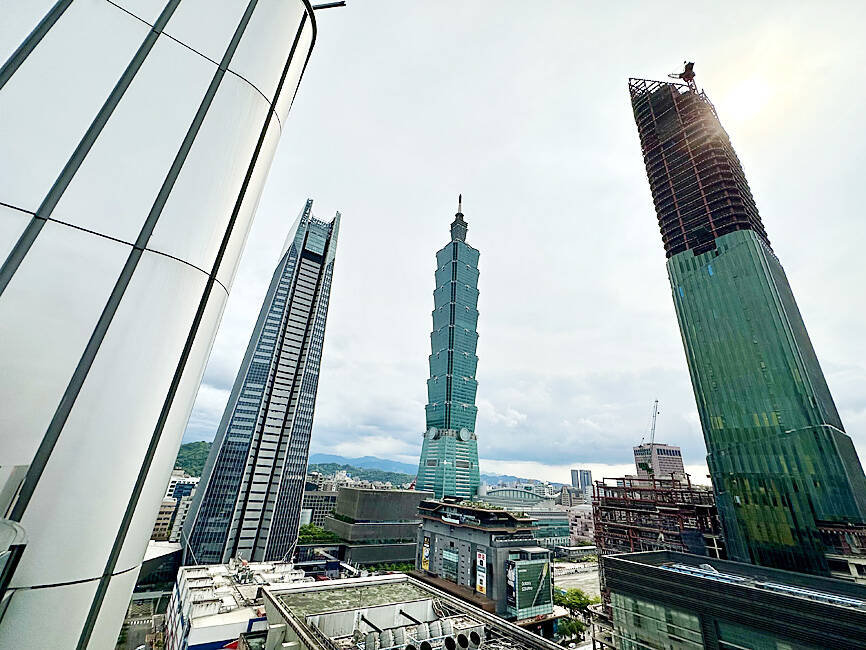Property transactions in the six special municipalities last month totaled 21,028 units, growing 23 percent from a year earlier, boosted by the preferential lending terms the government introduced in August for first-home purchases, real-estate brokers said on Wednesday.
The advent of the high sales season and first-home purchases encouraged by low interest rates underpinned the pickup in deals, Taipei-based Sinyi Realty Inc (信義房屋) said.
The volume for the whole of this year might now challenge the 300,000 unit mark, an important confidence threshold, the nation’s only listed broker said.

Photo: Hsu Yi-ping, Taipei Times
Buyers with real demand have dominated the market this year as a series of unfavorable policy measures scared away investors, Sinyi said, adding that low bases in the second half of last year helped drive the year-on-year improvement.
The uptick is most evident in Tainan, with a spike of 66.8 percent from a year earlier to 2,704 units, as people regained interest in owning apartments near technology firms, Great Home Realty Co (大家房屋) said.
Deals gained 54.6 percent to 5,955 units in New Taipei City, partly on the back of new house deliveries in Jhonghe (中和), Sinjhuang (新莊) and Sindian (新店) districts, it said.
Kaohsiung also benefited from new house deliveries, which helped lift transactions 15.5 percent to 2,961 units, local data showed.
Transactions in Taipei improved 17.3 percent to 2,259 units, while they rose 11.8 percent to 3,721 units in Taoyuan, official data showed.
Interest in existing homes also staged a comeback, Great Home said.
Taichung proved the only exception with an 8.6 percent year-on-year retreat in deals to 3,721 units, data showed.
A lack of affordable properties and new themes accounted for the below-par showing, Great Home said.

SELL-OFF: Investors expect tariff-driven volatility as the local boarse reopens today, while analysts say government support and solid fundamentals would steady sentiment Local investors are bracing for a sharp market downturn today as the nation’s financial markets resume trading following a two-day closure for national holidays before the weekend, with sentiment rattled by US President Donald Trump’s sweeping tariff announcement. Trump’s unveiling of new “reciprocal tariffs” on Wednesday triggered a sell-off in global markets, with the FTSE Taiwan Index Futures — a benchmark for Taiwanese equities traded in Singapore — tumbling 9.2 percent over the past two sessions. Meanwhile, the American depositary receipts (ADRs) of Taiwan Semiconductor Manufacturing Co (TSMC, 台積電), the most heavily weighted stock on the TAIEX, plunged 13.8 percent in

A wave of stop-loss selling and panic selling hit Taiwan's stock market at its opening today, with the weighted index plunging 2,086 points — a drop of more than 9.7 percent — marking the largest intraday point and percentage loss on record. The index bottomed out at 19,212.02, while futures were locked limit-down, with more than 1,000 stocks hitting their daily drop limit. Three heavyweight stocks — Taiwan Semiconductor Manufacturing Co (TSMC, 台積電), Hon Hai Precision Industry Co (Foxconn, 鴻海精密) and MediaTek (聯發科) — hit their limit-down prices as soon as the market opened, falling to NT$848 (US$25.54), NT$138.5 and NT$1,295 respectively. TSMC's

TARIFFS: The global ‘panic atmosphere remains strong,’ and foreign investors have continued to sell their holdings since the start of the year, the Ministry of Finance said The government yesterday authorized the activation of its NT$500 billion (US$15.15 billion) National Stabilization Fund (NSF) to prop up the local stock market after two days of sharp falls in reaction to US President Donald Trump’s new import tariffs. The Ministry of Finance said in a statement after the market close that the steering committee of the fund had been given the go-ahead to intervene in the market to bolster Taiwanese shares in a time of crisis. The fund has been authorized to use its assets “to carry out market stabilization tasks as appropriate to maintain the stability of Taiwan’s

In a small town in Paraguay, a showdown is brewing between traditional producers of yerba mate, a bitter herbal tea popular across South America, and miners of a shinier treasure: gold. A rush for the precious metal is pitting mate growers and indigenous groups against the expanding operations of small-scale miners who, until recently, were their neighbors, not nemeses. “They [the miners] have destroyed everything... The canals, springs, swamps,” said Vidal Britez, president of the Yerba Mate Producers’ Association of the town of Paso Yobai, about 210km east of capital Asuncion. “You can see the pollution from the dead fish.